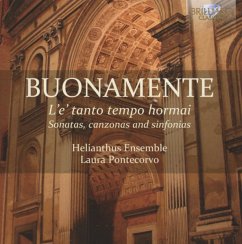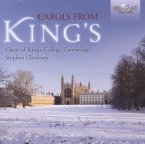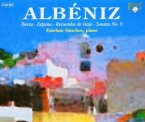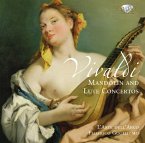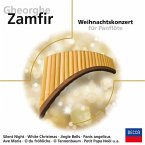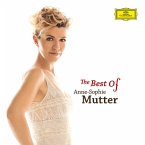Italian composer Giovanni Battista Buonamente, a member of the Franciscan order, gained renown throughout Europe as a violinist, singer and choirmaster. He began his career as the Gonzaga court in Mantua, later becoming a chamber musician at the Viennese court of Ferdinand II and his final post was as chapel master at the Sacro Convento in Assisi, where he remained until his death in 1643 and his compositions many characteristics of the early Italian Baroque. This disc, inspired by a collection of instruments that were left to the Sacro Convento by Abbot Rivi in 1704, includes a selection of pieces from volumes IV, VI and VII of Buonamente's instrumental music. The first three volumes of this collection were lost, and the surviving volumes of the original collection were destroyed by fire at the Wroclaw library in Poland, where they had been housed. The pieces on this disc were chosen with the intent of using the instruments that Abbot Rivi had bequeathed to the Sacro Convento, along with the violin, theorbo, cello, organ and harpsichord, which records show were also present at the convent. Laura Pontecorvo, a baroque flute specialist, has played first flute with the Concerto Italiano and regularly collaborates with ensembles such as Accademia Bizantina, Divino Sospiro, Europa Galante and Accordone, L'Arte dell'arco. She has performed as a soloist all over the world and has recorded for several record labels including Opus 111 and Stradivarius. She is joined on the recording by the Helianthus Ensemble. Other information: - Recorded in 2012. - Giovanni Battista Buonamente started his career in his native Mantua, left for the Viennese Court of Ferdinand II and finally settled in Assisi as Chapel Master of the Sacro Convento. The works, instrumental sonatas and canzonas, are in the early Italian Baroque style, and offer several dance forms like Brando, Gagliarda and Corrente. - The booklet notes tell the interesting story about the composer, and the fascinating quest for the manuscripts.
| CD | |||
| 1 | Sonata sesta sopra "Rugiero" (für Violine, Flöte und Theorbe) (1626) | 00:05:16 | |
| 2 | Sonata quinta (für Violine, Cornettino, Theorbe und Orgel) (1636) | 00:05:04 | |
| 3 | Canzon à 4 (für Kornett, Viola, Flöte, Dulcian und Orgel) (1636) | 00:02:38 | |
| 4 | Sonata nona sopra "Quello e' quel loco" (für Cornettino, Flöte, Theorbe und Cembalo) (1626) | 00:03:46 | |
| 5 | Sinfonia seconda detta la Rovetta (für Violine, Flöte, Violoncello, Theorbe/Barockgitarre und Orgel/Cembalo) (1637) | ||
| 6 | 2. Brando | 00:01:48 | |
| 7 | 3. Gagliarda | 00:01:03 | |
| 8 | 4. Corrente | 00:02:23 | |
| 9 | Sonata prima à 2 (für Flöte, Violine und Theorbe) (1636) | 00:02:32 | |
| 10 | Sonata prima à 3 (für Cornettino, Flöte, Dulcian, Theorbe und Orgel) (1636) | 00:04:24 | |
| 11 | L' e' tanto tempo hormai (für Flöte, Violine, Violoncello und Theorbe) (1626) | 00:05:52 | |
| 12 | Canzon quinta à 4 (für Violine, Cornettino, Flöte, Dulcian, Theorbe und Orgel) (1636) | 00:04:29 | |
| 13 | Sonata terza à 2 (für Cornettino, Flöte, Theorbe und Orgel) (1636) | 00:03:59 | |
| 14 | Sinfonia terza detta la Sagreda (für Cornettino, Violine, Violoncello, Theorbe/Barockgitarre und Cembalo) (1637) | ||
| 15 | 2. Brando | 00:01:04 | |
| 16 | 3. Gagliarda | 00:01:22 | |
| 17 | 4. Corrente | 00:01:22 | |
| 18 | Sonata quarta (für Violine, Cornettino und Orgel) (1636) | 00:04:49 | |
| 19 | Sonata decima sopra "Cavaletto zoppo" (für Kornett, Flöte, Dulcian, Theorbe und Cembalo) (1626) | 00:03:53 | |
| 20 | Canzon terza à 4 (für Flöte, Viola, Cornettino, Dulcian, Theorbe und Orgel) (1636) | 00:04:47 | |

